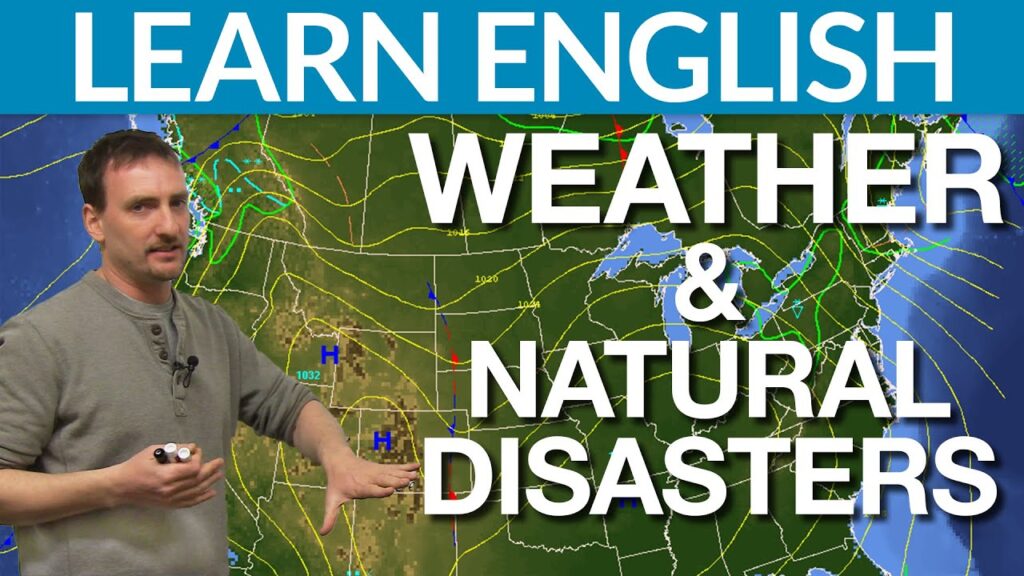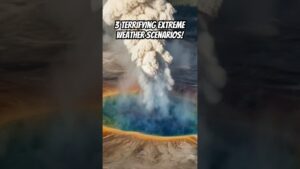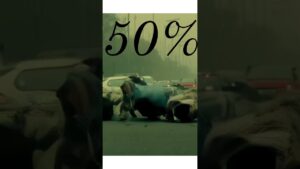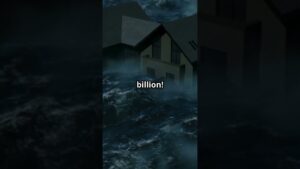
http://www.engvid.com Worried about natural disasters like hurricanes, earthquakes, and tsunamis? When we make small talk in English, we often talk about the weather and recent natural events on our planet. In this lesson, I’ll teach you English vocabulary to talk about weather, climate, and natural disasters. Watch this lesson, and you’ll learn how to follow climate news, how to discuss weather trends, and much more. Take the quiz to test your understanding! When you’re done, practice by posting a comment about a natural disaster in your country. http://www.engvid.com/vocabulary-weather-climate-natural-disasters/
TRANSCRIPT
Hi. Welcome again to www.engvid.com. I’m Adam. Today’s lesson comes from a few requests from the www.engvid.com comments section. Some people wanted to know about natural disasters. So what I have here is a bit of a combination of climate vocabulary and natural events. I don’t call them “disasters” because, realistically, they’re only disasters to humans; to nature, they are just events. Okay?
Before we begin, I want to make sure we understand the difference between “climate” and “weather”. “Weather” is the occurrence of nature every day. Today is sunny, tomorrow is raining, today is a little bit chilly, tomorrow is going to be nice and warm. Every day’s situation is the weather. “Climate” is the pattern over usually we talk about a year. So if a country or a place has four seasons: spring, summer, fall, winter – each season has its own climate; rainy, hot, humid, whatever the case may be. So we’re going to look at climate and natural events that usually go together. Now, this last year or the past 2 or 3 years have seen some very crazy weather-or sorry-climate events. So I’m going to give you some words to be able to discuss these amongst yourselves.
First, we’re going to start with: “flood” and “drought”. Okay? The “h”, the “gh” not pronounced. “Drought”, “flood”, like going up. So “flood” is when there’s too much water. Very heavy rain, sometimes it’s because snow melts too quickly in hills or mountains. All the water comes into a low place or a flat place, the earth doesn’t absorb it quickly enough or the sewage can’t take all of it, the pipes, etcetera so all the water rises up above the ground, goes into your houses, into the subway stations, everywhere. That’s a flood, a flood. “Drought” is the complete opposite. A “drought” is what happens when a region or a place doesn’t get water, doesn’t get any rain for a very long period of time. Everything dries out, all the crops, all the wheat, and rice, and everything dies. Sometimes this leads to a famine. Okay? A “famine” is when there’s a lot of people starving. Okay? So this is a natural disaster because human beings and animals are starving because everything died in the drought, there’s nothing to eat.
Okay, next we have: “earthquake”. “Quake” basically means shake. An “earthquake” is when the earth shakes. Okay? Now, what often happens is when there’s an earthquake in the sea or near the sea, there’s often a “tsunami”. Now, this is actually a Japanese word. Actually, it’s two Japanese words, but they are used so commonly that we just take them as an English word now. “Tsunami” means harbour wave. Not so important for you guys right now, but it’s basically a big wave or a big series of waves that after the earthquake, all the water in the seas or the oceans starts moving around, sometimes it moves on to the land and just destroys everything. I think everybody probably remembers the tsunami from 2006 or so in Indonesia, in that area, very destructive, in Japan a couple of years ago – huge tsunamis.
Next, this is what we’re experiencing lately with climate change, global warming, whatever you want to call it: “heat waves” and “cold fronts”. Now, if you watch the news, the weather channel, for example, sometimes you’ll see something like this, you’ll see lines with semicircles moving. Other times, you’ll see red lines with triangles moving. The blue lines, these are cold fronts, means a very cold mass of air, the cold amount of air is moving. The red one, same thing but heat, a lot of heat. Heat waves are very dangerous because they come very suddenly, it gets very, very hot. A lot of people suffer from it, a lot of people die from it. Same with a cold front, suddenly the temperature really, really drops, minus 20, minus 30, minus 40. And again, very, very dangerous; you don’t want to be outside when that happens.
source




If you liked this video, check out my new lesson on WATER vocabulary! I cover key words like "desalination", "aquifer", "potable", and more. https://youtu.be/xmNRthBNMO8
That's crazy english
Adam! I think you are a pretty intelligent teacher, you don't only explain, but also share additional info. Thanks!
ths for the information knowing them all
Very nice your channel professor 👍💯 God bless you 🙏
Gostei da sua explicaçáo professor.muito bem.aprendi sua linguagem bastante através de vocé.te sigo
Eu coloco todos os seus vídeos no status do meu watzapp
Thank you.
Super good and simple. You are a great teacher.I love your lessons.They are easy to remember.
Awesome!
Study to speaking english exam
can i say tropical season or weather?
This is a helpful lesson. I enjoyed it and do hope my students will enjoy as well tomorrow. 🙂 Thanks!
No words can express your giant way of teaching . It's is not the first time I watch your lessons.Every lesson I admire your perfect way of teaching, Thanks Adam
❤️❤️❤️
your the best
thank u very much
Thank you so much for this lesson, 👍
Thanks Sir
❣️
Sir Adam I can't see words properly ..plz try to show whiteboard clearly …plzzz plzz u are only one source of knowledge for Me so plzzzzz sir …
Good
Thumbs up!
thank you mister Adam —–from istanbul 2021
I appreciate your efforts for give a better English to nationals.thank you.
I can make out of all that you explain. you're doing pretty good . I want to go on watching your videos, which is so useful to improve my knowledge and learning . Thank you so much!
Many thanks for clear explanations 😊
Dear Adam, just adore the way you present such a topic. You're really good at explaining difficult things in a simple way. Will use your video for my intermediate students. Thank you.
Топ
Your lessons are superb. Thank you so much
thanks boss
hy.ilove,this,youtup
think you so much for that
This is low in sound so kindly use loud speaker with pitched
Easey understand, thanks!
🤤
İt is easy to understand